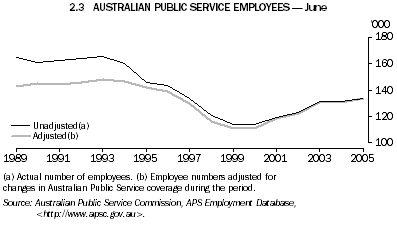AUSTRALIAN PUBLIC SERVICE
The Australian Public Service (APS) provides policy advice to the Australian Government and facilitates the delivery of programs to the Australian community. It is part of the broader public sector, which includes parliamentary departments and employees, the staff of members of parliament and ministers, Australian-owned companies, statutory authorities, a separate public service for each of the states and territories, and local government employees. There are currently 18 government departments, 65 statutory authorities, five executive agencies and 23 other government bodies in the APS. A list of these bodies is available at <http://www.apsc.gov.au/apsprofile/agencies.htm>.
Departments, statutory authorities and executive agencies are governed by legislation specific to their functions, and by the Financial Management and Accountability Act 1997 (Cwlth) (FMA Act). This Act details specific requirements for the management of human and financial resources. The 18 departments and five executive agencies, a majority of statutory agencies and some government bodies are also subject to the Public Service Act 1999 (Cwlth) (PS Act). Some government bodies operate with a degree of independence with their own collective agreements and/or are identified separately under the FMA Act or the Commonwealth Authorities and Companies Act 1997 (Cwlth) but are still defined as APS agencies under the PS Act.
Each government department is managed by a Chief Executive Officer, or Departmental Secretary, who is responsible to the relevant minister for the ‘efficient, effective and ethical’ use of resources. The minister, in turn, takes political responsibility for the actions of the department. As well as answering to the relevant minister, the APS is accountable to the Australian community through a variety of mechanisms including parliamentary committees, administrative law, the Ombudsman and the Auditor-General. Statutory agencies are responsible for a specific function described within departments’ portfolio responsibilities. For example, the Australian National Audit Office falls within the Department of the Prime Minister and Cabinet and provides a range of audit services to the Parliament and Australian Government public sector agencies.
In June 2005, there were 133,596 APS employees working under the PS Act (graph 2.3). Of this number, there were 123,242 ongoing employees and 10,354 were non-ongoing. All APS employees have a responsibility to comply with all applicable Australian laws and are held accountable for their work practices, such as: the Commonwealth Authorities and Companies Act 1997 (Cwlth), the Workplace Relations Act 1996 (Cwlth), the Criminal Code Act 1995 (Cwlth) and the Crimes Act 1914 (Cwlth).
In addition, APS employees are subject to the APS Values and Codes of Conduct. These guidelines require public servants to act ‘responsively, accountably, impartially and with integrity’ when working with other APS employees and the public. The guidelines are available at <http://www.apsc.gov.au/values/conductguidelines.htm>.

 Print Page
Print Page
 Print Page
Print Page